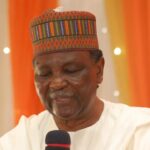
Just as the cliché goes that ‘it is better to be late than never’, the democratic heritage of the country is set for further enrichment through a proposed amendment to the Constitution by the National Assembly. The new dispensation is the rectification of the present imbalance in the membership of the Council of State (COS), by including the past presiding officers of the country’s central legislature. Coming relatively late in the day, this proposed amendment constitutes one of the 23 recommendations of the Special Adhoc Committee on Constitutional Review of the House of Representatives. As constituted the COS remains the highest advisory body with respect to governance in the country, with members comprising the President of the country who is also the Chairman, the Vice President who is the Vice Chairman, the President of the Senate, the Speaker House of Representatives, the Chief Justice of the Federation, all past Chief Justices, all state governors and the Attorney General of the Federation. Conspicuously absent are the past presiding officers of the National Assembly.
With the inclusion of the past presiding officers, hope has been kindled that beyond the provision of balance and fairness in this all important national organ, the dispensation will provide a formal interface between the old and the new of the full complement of top leadership of all the three arms of government to contribute their historical and contemporary perspectives to the cause of national development. As provided for in the Third Schedule of the Constitution, the COS is established to serve as the ultimate consultative facility for guidance of the country with respect to designated critical aspects of the nation’s life such as the appointment of the members of strategic national institutions.
Hence the absence of the past presiding officers of the National Assembly remains a major lacuna in the operations of the body, and can only be justified by the erroneous dispensation of reading the country’s history upside down and acting as if the country can do without the critical inputs from the institutional elders of the parliament – being the past presiding officers. In this respect kudos must go to the leadership of the Eighth National Assembly for this novel step they are taking in order not only to enrich the country’s leadership with the benefits of the institutional experience of the legislature but also bridge the gap between the old and new in the polity. At least the face of the country’s revered past presiding officers like the venerable Dr Joseph Wayas – the President of the First and Second National Assemblies in 1979 – ’83, and others will no more be confined to the pages of dusty books and files, or at best in picture frames on the walls of the National Assembly. They will now be seen and heard as they make their sterling contributions to the cause of national development.
While the fuller import of this dispensation may be lost on the uninitiated, it nevertheless offers dividends of humongous proportions to the country beyond providing mere balance of representation of the three arms of government, in the COS roll call. Against the backdrop of the chequered history of the country’s legislature with respect to its serial truncation at the advent of every military takeover of power, governance in Nigeria has featured a disposition whereby the legislature has been relegated to the back burner and hence denied its primacy. This is even as the Constitution recognises it as the first arm of government. The recognition of the legislature as the first arm of government by the Constitution is informed by its role as the direct representatives of the citizenry to whom government should belong, in a democracy. By the contemplation of the constitution the very processes of governance should be driven by the prescriptions of the legislature, acting on behalf of the people.
In the Nigerian situation the reverse is the case as it is fashionable for various potentates to denigrate the legislature at any given opportunity, with the expectation of dousing its irritant value of making public what such potentates may not want the public to see. The sin of the legislature is that it functions as the only direct nexus between the citizen and the government, and therefore serves as the immediate anti-thesis for dictatorship. Yet it is no wonder that the most progressive countries of the world are flourishing democracies, with robust legislative institutions, in spite of whatever sins may be ascribed to the legislature.
In the same vein an immediate manifestation has spawned into the series of divisive tendencies all around the country. For instance it may even be asked what has the legislature got to do with the present challenges of Boko Haram, Niger Delta militancy, Indigenous People of Biafra (IPOB), Oduaa Peoples Congress (OPC), to name a few. The answer to that question cannot but be in the affirmative given that all of them remain the direct result of the diminished scope for dialogue and tolerance among the hundreds of constituent ethnic groups that make up the country. In the absence of provision to talk things over with these groups, and perhaps many more that are presently in the pipeline, being more assertive actors and factors, have demonstrated the extreme dimension to which they are ready to press their demands. And it is for availing society the room for such dialogue that the legislature is defined. No other forum exists in modern governance for a society to deliberate over its affairs, hard and sensitive as they may be, other than the legislature.
With the inclusion of the past presiding officers in the COS template the onus now lies with the National Assembly leadership to facilitate a prompt buy-in by the Nigerian public into the innovation on the grounds of its ultimate utility to the country’s democracy project. If during the framing of the Constitution the military authorities had in their traditional condescending disposition towards the legislature, wilfully created the anomaly, it should be seen for what it is – a mere error.
Let this new deal not only end with the mere inclusion of the past presiding officers in the COS with the attendant provision of deserved life pension for them. A more significant dividend is that they are also mainstreamed into the routine functions of the National Assembly.
 Join Daily Trust WhatsApp Community For Quick Access To News and Happenings Around You.
Join Daily Trust WhatsApp Community For Quick Access To News and Happenings Around You.


